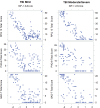IGF-1 as a Biomarker for Symptom Severity in Adult Traumatic Brain Injury: Evidence from an Observational Study
- PMID: 40697802
- PMCID: PMC12281112
- DOI: 10.1089/neur.2025.0009
IGF-1 as a Biomarker for Symptom Severity in Adult Traumatic Brain Injury: Evidence from an Observational Study
Abstract
Traumatic brain injury (TBI)-related growth hormone deficiency is often undertreated, despite documented physical, metabolic, and neuropsychiatric effects. Insulin-like growth factor (IGF-1), with neuroreceptors located in brain regions responsible for learning, memory, and mood, regulates cerebral blood flow, neurogenesis, and neuroplasticity. The aim of this study was to determine associations between IGF-1 levels and post-TBI symptom severity, anxiety, and depression. This retrospective observational study at an Academic Brain Injury Center included participants evaluated 3-12 months post-TBI with available IGF-1 values and complete Rivermead Post-Concussion Symptoms Questionnaire (RPQ-13), Generalized Anxiety Disorder-7 (GAD-7), and Patient Health Questionnaire-9 (PHQ-9) responses. Patients under 18 or over 65 and those with incomplete data were excluded. Participants were grouped by TBI severity: mild (Glasgow Coma Scale [GCS] 13-15) and moderate-to-severe (GCS < 13). IGF-1 Z-scores were standardized for age and gender. Significant negative correlations were found between IGF-1 levels and RPQ-13, GAD-7, and PHQ-9 scores across all TBI severity groups, with lower IGF-1 Z-scores correlating with higher symptoms of TBI, depression, and anxiety. The Generalized Linear Models showed that the IGF-1 Z-score is a significant predictor for GAD-7, PHQ-9, and RPQ-13. Specifically, a one-point increase in the IGF-1 Z-score is associated with a 29.85% decrease in anxiety symptoms on the GAD-7, a 16.30% reduction in depression severity on the PHQ-9, and a 39.23% decrease in post-TBI symptom severity on the RPQ-13. Findings suggest that decreased IGF-1 is associated with increased post-injury symptom severity, depression, and anxiety. Future studies should explore IGF-1 as a biomarker for TBI symptom severity.
Keywords: biomarker; growth hormone deficiency; insulin-like growth factor 1; neuroendocrine dysfunction; traumatic brain injury.
© The Author(s) 2025. Published by Mary Ann Liebert, Inc.
Figures



References
-
- Zgaljardic DJ, Guttikonda S, Grady JJ, et al. Serum IGF-1 concentrations in a sample of patients with traumatic brain injury as a diagnostic marker of growth hormone secretory response to glucagon stimulation testing. Clin Endocrinol (Oxf) 2011;74(3):365–369; doi: 10.1111/j.1365-2265.2010.03935.x - DOI - PubMed
LinkOut - more resources
Full Text Sources
Miscellaneous
